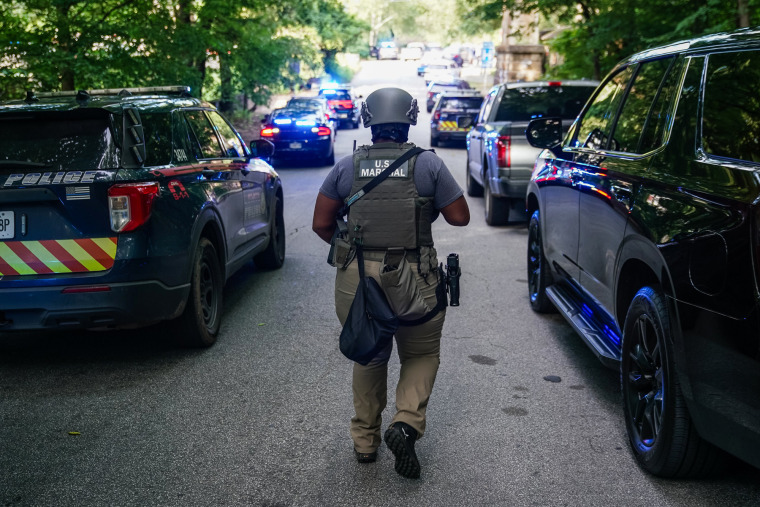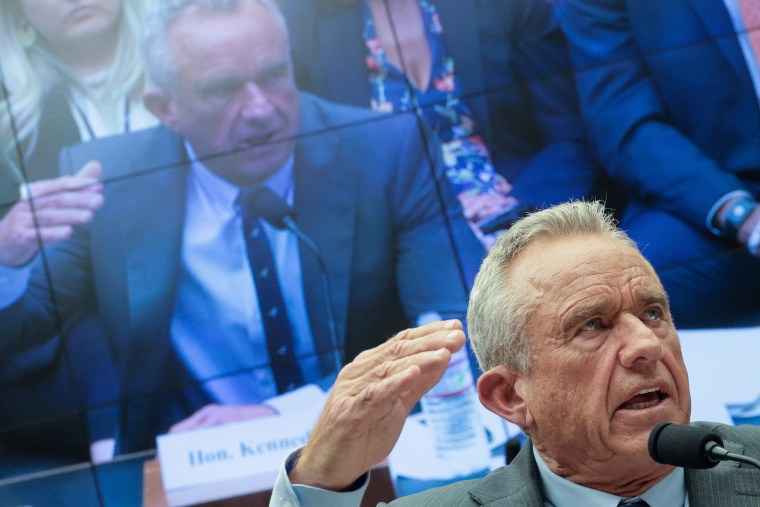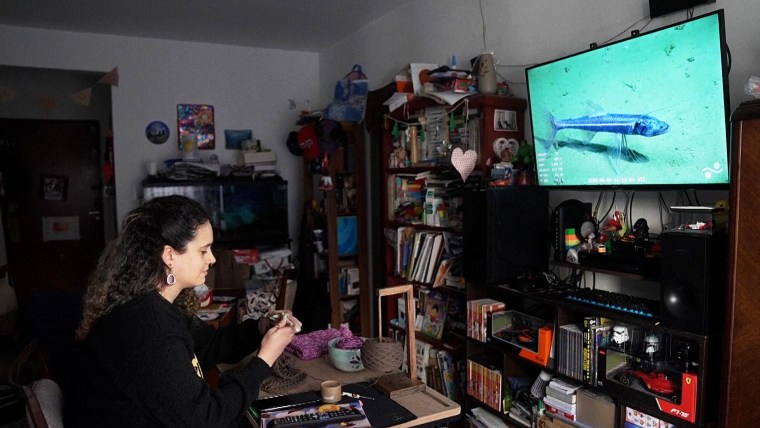Anti-vaccine myths surged online ahead of the CDC shooting

In the weeks and months before the Aug. 8 shooting at the Centers for Disease Control and Prevention headquarters in Atlanta, posts tying Covid vaccines to mental illness accrued millions of views online.
Previously more tightly moderated, some of the world’s largest social media platforms now operate with far fewer guardrails, allowing vaccine misinformation to flourish.
On X, for example, verified accounts with hundreds of thousands of followers openly claimed in recent weeks that Covid vaccines act like “chemical lobotomies,” which is false.
On Facebook, health influencers with broad reach alleged that Covid vaccines cause severe brain damage or other severe side effects such as cancer, despite no scientific basis for those claims.
And on TikTok, videos repeating the debunked claim that vaccines cause autism drew hundreds of thousands of views this year, spreading doubt to wide audiences.
The posts are just one part of a now-chaotic information ecosystem that internet users navigate when they look for information about vaccines. In that environment, incomplete or out-of-context information is often snipped, packaged to fit predisposed narratives and then rapidly amplified across text, short-form video or audio content.
In theory, interest in vaccines and the spread of related misinformation should have tapered off as the pandemic subsided, said Samuel Woolley, a tech and misinformation researcher at the University of Pittsburgh. But that hasn’t happened, he said, in part because of the Make America Healthy Again movement and the mainstreaming of many of Health and Human Services Secretary Robert F. Kennedy Jr.’s anti-vaccine ideas.
“It’s arguably gotten worse,” Woolley said.
The quality of information around vaccines came into the spotlight after the CDC headquarters shooting. The gunman, Patrick White, who shot nearly 200 rounds at the building and killed a security guard, blamed a Covid vaccine for his mental health issues, including depression.

It’s not known what the shooter’s media diet was or whether he was aware of online conversations sowing doubt in Covid vaccines. The rhetoric was easy to find, though: Conspiracy theorists and anti-vaccine pundits command huge audiences online, and Kennedy himself has shared vaccine misinformation in office.
HHS didn’t respond to questions about Kennedy’s past comments. In a statement, Communications Director Andrew Nixon said Kennedy “has unequivocally condemned the horrific attack and remains fully committed to ensuring the safety and well-being of CDC employees.”
White’s previous statements align with growing online skepticism toward vaccines and the belief that they have a slew of unacknowledged side effects.
A law enforcement official told NBC News that White, 30, had made suicidal statements in the past and recently attributed his health issues to the vaccine he received.
And a neighbor told The Atlanta Journal-Constitution that White “was very unsettled, and he very deeply believed that vaccines hurt him and were hurting other people.” The newspaper also reported, citing police incident reports, that the shooter said something similar to police last year, when he was threatening to harm himself and officers went to his home.
Online, vaccine skeptics have been met with less pushback from social media companies for sharing their beliefs than before or during the peak of the Covid pandemic. Under owner Elon Musk, X has stopped enforcing previous policies trying to control Covid vaccine misinformation. Musk himself said in 2023 that he had an adverse reaction to a Covid vaccine booster, but he doesn’t appear to have elaborated on his symptoms or how long they lasted. His representatives didn’t respond to a request for comment.
In February, Meta, which owns Facebook and Instagram, ended its independent fact-checking program in the United States and announced a “community notes” system, in which users can vote on fact-checks written by other users.
By rolling back content moderation even for dodgy health claims, tech companies are harking back to an earlier, pre-pandemic era when they saw themselves as mostly neutral players in information wars. They briefly abandoned that idea of neutrality early in the coronavirus pandemic.
“The really manipulative, clearly malicious stuff needed to be taken down. Today that’s not really happening,” Woolley said.
TikTok, which bans misleading information about vaccines in its community guidelines, removed three videos that falsely said vaccines cause autism after NBC News asked about them. The company didn’t respond to questions about why its systems didn’t catch the posts earlier.
A spokesperson for Facebook, which also says it prohibits vaccine misinformation in its community guidelines, had no immediate comment.
X, which doesn’t prohibit misinformation about vaccines or any other topic, didn’t respond to a request for comment on the posts on its platform.
Kari Bundy, an anti-vaccine health influencer with 212,000 followers on Facebook, wrote in a post after Friday’s shooting that she understood where the gunman was coming from even while she condemned the shooting.
“His unhinged behavior mirrors the anguish of those who, after being injured, are gaslit and dismissed, driving some to desperate, unconscionable acts,” she wrote on Facebook. She declined an interview request.
Experts say there’s no clear evidence that vaccines cause depression. And the CDC doesn’t list depression among the side effects for Covid vaccines.
But for more than a year, anti-vaccine activists have argued on social media that there is a link.
The narrative gained traction in February after prominent anti-vaccine figures seized on a preprint paper from Yale University researchers examining potential vaccine side effects, including depression. Preprint papers haven’t been peer-reviewed or published in medical journals, which is the gold standard for reliable scientific research.
The preliminary paper didn’t show cause-and-effect or a correlation between vaccination and depression, but it quickly caught the attention of high-profile figures such as Musk and podcaster Joe Rogan, who pointed to it as evidence of the hazards of Covid shots.
The preprint paper “feeds into a narrative that’s been around for years, that the Covid vaccine is spilling out these spike proteins that are poisoning people’s bodies, and that happens to coincide with a conspiratorial political framework that’s been around for a while,” said Dr. Adam Gaffney, an assistant professor of medicine at Harvard Medical School. That narrative, though, is not correct.
The paper identified lingering amounts of spike protein — a component of the coronavirus that helps it invade cells — in some people’s blood samples. But its authors have said vaccines themselves aren’t likely to be the cause. The spike-protein mRNA they contain degrades after a few days and is not itself infectious.
Fears that vaccines are dangerous and that doctors are covering up the side effects have also drawn interest on Capitol Hill. In July, Sen. Ron Johnson, R-Wis., held a hearing with testimony from people who said vaccines injured them or their loved ones, and clips from the hearing spread on Facebook and other platforms. Representatives for Johnson didn’t respond to a request for comment on the CDC gunman.
CDC Director Susan Monarez pointed to the harms of misinformation at an agency all-hands meeting Tuesday that addressed the shooting, according to a transcript obtained by NBC News.
“We know that misinformation can be dangerous. Not only to health, but to those that trust us and those we want to trust. We need to rebuild that trust together,” she said.
Dr. Dan Barouch, director of the Center for Virology and Vaccine Research at Beth Israel Deaconess Medical Center in Boston, said he’s not aware of evidence that depression is a side effect of vaccination.
“Depression is very common, and the vaccine is common, and so it’s not clear … whether there may be a causal association,” he said.
“The questions about either mental health or post-vaccine syndrome, those deserve to be studied. More data is better, and data should lead the way as opposed to speculation,” he said.
Kennedy once called the Covid vaccine “the deadliest vaccine ever made,” despite data showing it’s safe, though he doesn’t appear to have linked Covid shots specifically to depression.

Kennedy has, on multiple occasions, tried to draw a connection between depression and a different vaccine, the one designed to protect against the human papillomavirus, or HPV. In a post on X in 2019 and in a 2020 podcast episode with anti-vaccine activist Del Bigtree, Kennedy asserted without evidence that the HPV vaccine, which can prevent 90% of cervical cancers, was responsible for depression among teenagers in the United States. Kennedy has also helped organize litigation over the HPV vaccine, but a federal judge ruled against the plaintiffs in March, saying their evidence was “lacking”; the plaintiffs are appealing.
The CDC says the HPV vaccine is safe and effective. It lists common side effects as arm pain, fever, headache, nausea and muscle or joint pain.
While Covid vaccines have saved many lives, they and all other medical treatments have some risk of side effects. A small number of people, disproportionately young men, develop a form of heart inflammation known as myocarditis after having gotten the shot, although Covid itself is likelier to cause heart problems, including myocarditis. In a 2021 study, the CDC reported fewer than 41 cases of myocarditis per million vaccine doses among boys and men ages 12 to 29.
In a 2022 paper from CDC researchers published in The Lancet Child & Adolescent Health, young people who developed myocarditis after Covid vaccinations often reported depression, with 46% of myocarditis patients surveyed saying they had it. A study published in the journal npj Vaccines in July, whose release coincided with a spike in online searches for “vaccine depression,” found a similar rate of depression among young people with post-vaccination myocarditis.
It’s not known whether the CDC shooter had myocarditis.
A different study last year looked at mental illnesses among Covid patients. The paper, which British researchers published in JAMA Psychiatry, found that depression and other mental illnesses were elevated for up to a year in people with severe Covid who hadn’t gotten a Covid vaccine.
And in the Yale preprint paper, posted on an online platform where researchers can share and receive feedback about unpublished work, researchers outlined what they called a “post-vaccination syndrome,” a collection of various symptoms that they said resembled long Covid. The report looked at 64 people — 42 with the proposed syndrome and 22 without — and found that participants with the syndrome reported depression at higher rates than other vaccinated people. The aim of the report wasn’t to find out whether Covid vaccines were linked to depression, nor did it establish such a link. Instead, it examined how people’s immune systems reacted to the shots.
One of the paper’s lead authors, Akiko Iwasaki, a Yale professor of immunobiology, cautioned in The New York Times that the report was “still a work in progress.”
Two of the co-authors, but not Iwasaki, belong to an advocacy organization for people who believe they were injured by Covid vaccines. The group is involved in litigation demanding compensation for vaccine injuries and challenging federal officials for labeling their claims as “misinformation.” One author, Brianne Dressen, is suing AstraZeneca over her participation in its Covid vaccine trial, claiming the company failed to appropriately compensate her after she developed nerve damage that she attributes to the vaccine. AstraZeneca has said it isn’t liable, citing an act that protects pharmaceutical companies from financial risk during public health emergencies.
Gaffney, of Harvard Medical School, said some of the preprint paper’s authors are “very serious scientists and people held in high esteem,” but he called the symptoms branded as “post-vaccine syndrome” in the paper “disparate.”
“We should just think twice before we enshrine new diagnoses that are premised on a cause-and-effect relationship that may be tenuous,” he said.
Vaccine opponents and skeptics have taken the research and run with it, stretching the limits of what experts say is accurate.
After the Yale preprint paper was published, Rogan mentioned the research on his show. Rogan, the No. 1 podcaster in the country by some charts, generally referred to vaccine side effects in the segment and said the findings in the preprint paper — which he referred to as a “study” without noting that it hadn’t yet been published in a peer-reviewed journal — were evidence of a massive cover-up.
“Everyone’s covering up, and people are lying about [it], and everyone’s trying to obfuscate, and doctors are trying to sweep things under the rug because they don’t want to be in trouble for mandating these things and telling people to get these things,” he said, referring to Covid vaccines.
In 2023, Rogan interviewed an anti-vaccine doctor who said on the show that a Covid vaccine led to his own clinical depression and suicidal ideation.
Representatives for Rogan didn’t respond to a request for comment Tuesday.
Conspiracy theorist Alex Jones also jumped on the Yale preprint paper, posting a video about it on X that drew more than 10 million views. Alex Berenson, an anti-vaccine writer, got more than 7 million views for a post on X in which he called the preprint report “very, very worrisome.” And Musk shared a post about it on X, boosting the idea of “vaccine injury.”
Representatives for Jones and Musk didn’t respond to requests for comment.
In an email Tuesday, Berenson said he doesn’t have a view on whether vaccines can cause depression, but he noted the link between the Covid vaccines and myocarditis and said that could be a potential mechanism that ultimately leads to depression. He said he stood by his X post in February and called the Yale preprint paper “highly concerning.” He also said it would be foolish to blame vaccine skeptics for the CDC shooting.
Similar ideas had been bubbling in anti-vaccine circles for a while before the Yale preprint report. At least two other posts on X alleging vaccines cause depression got more than 1 million views, both citing a study out of South Korea last year that suggested an increased risk of depression after Covid vaccination but a decreased risk of other psychiatric conditions. The study, which didn’t prove causation, was based on data from South Korea’s national health insurance system. The authors said Covid infections were also associated with depression and cognitive impairment.
A large study published in July found that the pandemic generally had adverse effects on brain health.
Woolley said people are more prone to gravitate toward conspiracy theories during emergencies like the Covid pandemic because they are scared.
“When crises happen — whether it’s the Covid pandemic or an earthquake — we see spikes in the spread of misinformation and disinformation,” he said.
For some people, pandemic lockdowns worsened an ongoing loneliness epidemic that has yet to subside, especially among young people. An NBC News Stay Tuned Poll from April found that nearly a third of U.S. adults under 30 are feeling lonelier and more anxious about the future than their elders. And a Gallup Poll from May found that young men were particularly vulnerable to loneliness.
That loneliness is now paired with social media recommendation algorithms designed to push persuasive or addictive content, often regardless of whether it’s accurate.
“Not only are you super scared, but the algorithms have a track record of pushing more and more extreme and conspiratorial content the deeper you go,” Woolley said.




